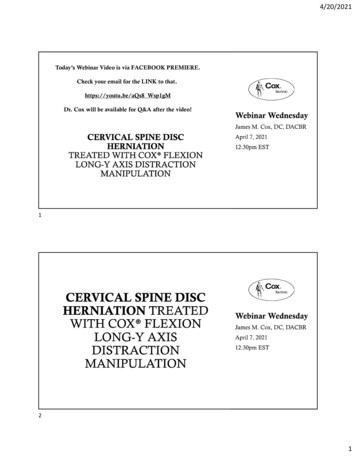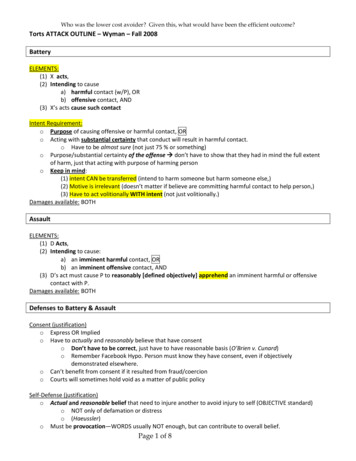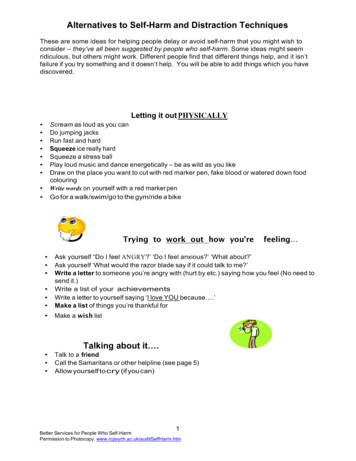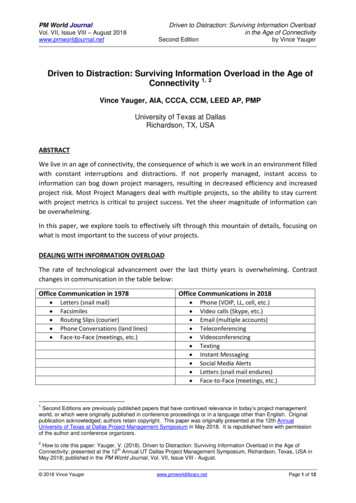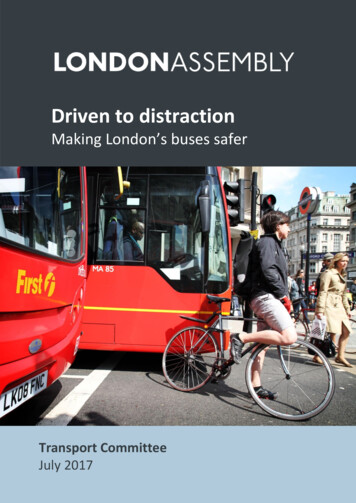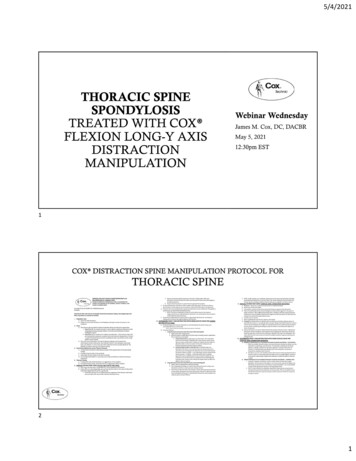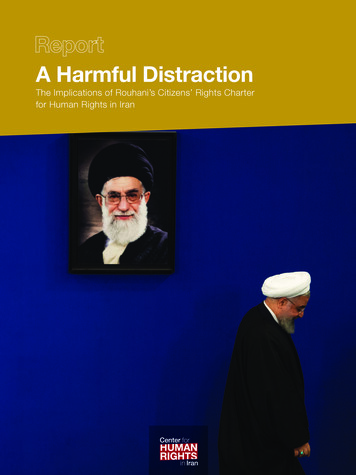
Transcription
A Harmful DistractionThe Implications of Rouhani’s Citizens’ Rights Charterfor Human Rights in Iran
A Harmful DistractionThe Implications of Rouhani’s Citizens’ Rights Charter for Human Rights in IranCopyright 2018 by the Center for Human Rights in IranAll rights reserved. No part of this report may be reproduced, stored ina retrieval system, or transmitted in any form or by any means, includingmechanical, electric, photocopying, recording, or otherwise, without theprior written permission of the Center for Human Rights in Iran.Center for Human Rights in IranNew YorkTel: 1 -347-689-7782www.iranhumanrights.orgA Harmful DistractionThe Implications of Rouhani’s Citizens’ Rights Charter for Human Rights in Iran
A Harmful DistractionThe Implications of Rouhani’s Citizens’ Rights Charterfor Human Rights in IranMay 2018www.iranhumanrights.org
About usThe Center for Human Rights in Iran (CHRI)is an independent, nonpartisan, nonprofitorganization dedicated to the protectionand promotion of human rights in Iran. CHRIinvestigates and documents rights violationsoccurring throughout Iran, relying on first-handaccounts to expose abuses that would otherwisego unreported. We bring these violations to theattention of the international community throughnews articles, briefings, in-depth reports andvideos, and work to build support for human rightsinside Iran as well. CHRI engages in intensiveoutreach and international advocacy aimed atdefending the fundamental rights and freedomsof the Iranian people and holding the Iraniangovernment accountable to its human rightsobligations.
Key Findings President Hassan Rouhani’s Citizens’ Rights Charter has had no impact onthe human rights crisis in Iran and should not be used as a reference point forprogress.By creating a charter that had no possible means of implementation orenforcement, and which does not address the causes of human rightsviolations in Iran, Rouhani delivered a document that cannot address thehuman rights situation in Iran.The Rouhani administration no longer intends to submit the Citizens’ RightsCharter to the Iranian Parliament as a bill.Reflecting continuously shifting strategies for the charter, the administrationnow states the purpose of the charter is to comprehensively documentIranians’ existing rights and promote public awareness of those rights.The charter contains vague pledges by Rouhani to submit bills to Parliamentin the future on citizens’ rights if needed, but no such legislation has beenintroduced as of this writing.The charter requires that governmental bodies submit “reports” on theirprogress regarding citizens’ rights, but few reports are available for publicreview and those that are do not provide a detailed or accurate assessment ofrights issues, violations or needs.Plans to create a “national institution” charged with implementing citizens’rights do not meet the requirements of the OHCHR Paris Principles that suchinstitutions be independent of the state.In none of the areas of basic rights delineated by the charter has there beenimprovement. In key areas explicitly referenced by the charter, including therights to freedom of thought and expression; access to information; privacy;association, assembly and demonstration; freedom of movement; and a fairtrial, the human rights situation in Iran has deteriorated.Moreover, serious human right violations continue to be carried out routinelyby ministries under Rouhani’s direct authority, particularly the Ministry ofIntelligence.5
The charter may be harming the rights situation in Iran by:Giving a false sense of progress that obscures the deterioration inhuman rights that has occurred and reduces pressure to addresshuman rights violations in Iran.Diverting attention from the actions Rouhani could take, includingholding his own Ministry of Intelligence accountable and questioning theJudiciary on violations of existing law in Iran.Slowing progress toward addressing the causes of human rightsabuses in Iran, which include a Judiciary and intelligence services thatsystematically act outside the law with impunity and a government thatat its highest level is unaccountable.RecommendationsTo the authorities in Iran State authorities should create an independent, national non-governmentalhuman rights institution according to the OHCHR Paris Principles, chargedwith investigating and publicly reporting on human rights violations in Iran andthe steps needed to implement the rights enshrined in Iranian domestic lawand its international obligations.State authorities should set up safe and effective grievance mechanisms forthe citizenry so that human rights violations can be publicly reported, with aclear and transparent process for independent investigation and remedy.President Rouhani should immediately address the rights violations beingcommitted by members of his own ministries, especially the Ministry ofIntelligence, and the ongoing pattern of unlawful arrests of activists, humanrights defenders, labor leaders and leaders of religious minoritiesconducted by its members.President Rouhani should utilize his powers embedded in Iran’s Constitutionto publicly address violations of citizens’ constitutional rights by any branch ofstate and by the country’s security and intelligence organizations.As Chairman of Iran’s Supreme National Security Council, Rouhani shouldpublicly refute the imprisonment of dozens of political prisoners for “nationalsecurity” offenses and demand the cessation of the house arrests of politicalopposition leaders.A Harmful DistractionThe Implications of Rouhani’s Citizens’ Rights Charter for Human Rights in Iran
To the international community The international community should no longer view or refer to the Citizens’Rights Charter as a document that has any relevance to the state of humanrights in Iran.In bilateral meetings with Iranian officials and diplomats and at multilateralgatherings, the UN and governments worldwide should urge the authorities inIran to take specific actions to address the human rights crisis in the countrythat are based on the identified areas of concern noted in the UN ThirdCommittee’s November 2017 resolution on Iran and the report of the specialrapporteur on Iran.The international community, including the UN high commissioner for humanrights, should press the Iranian authorities to cooperate fully with the UNspecial mechanisms, in particular, to cooperate with and allow entry into thecountry by future UN special rapporteurs on the situation of human rights inIran.7
In December 2016, President Hassan Rouhani published his Citizens’ RightsCharter—a document meant to strengthen political, social and economic rights inIran.1 The charter’s 120 articles collect and explicitly reaffirm the citizenry’s basicrights and freedoms that are enshrined in Iranian law, including freedom of thoughtand expression; access to information; privacy; the right of association, assemblyand demonstration; freedom of movement; and the right to a fair trial, amongnumerous other areas.The charter was presented as a fulfillment of Rouhani’s campaign promise, madeduring his first run for the presidency in 2013, to set out and defend the citizenry’sbasic rights. Yet more than a year after the signing of its final version, the charter hasslipped into irrelevancy, its essential hollowness revealed. Not only have there beenno tangible improvements in the human rights situation in Iran, in many key areasspecifically referenced by the charter there has been further deterioration.Given that the rights contained in the charter are already in Iran’s Constitution andexisting body of law, the nature of the charter is (and never was) clear. Nor is theintent of President Rouhani, who could not have been unaware that there wasno path to implementation of the document—especially given the hostility to thevery notion of strengthening basic rights and freedoms in Iran by the Judiciary, bymultiple security and intelligence agencies, and by Iran’s supreme leader, AyatollahAli Khamenei, who is the ultimate authority in the country, and their view that thecountry’s human rights file is exclusively the mandate of the Judiciary.Moreover, given that the document does not address any of the causes of the rightsviolations in Iran, there is concern that the charter could do harm, serving to presenta false sense of progress that undermines pressure for reform, diverting attentionfrom the grave state of human rights in Iran and impeding measures that could betaken to improve the rights situation.2This report by the Center for Human Rights in Iran (CHRI) charts the course andimpact of the Citizens’ Rights Charter and assesses its implications for humanrights advocacy in the Islamic Republic. It is based on extensive CHRI reporting andinterviews over the 2013-2018 period with diverse members of Iranian civil society,including journalists, lawyers, human rights defenders and activists, analysis ofstate policy and inter-governmental relations, detailed review of human rights casesand developments in Iran, and meetings with government officials from numerouscountries.A Harmful DistractionThe Implications of Rouhani’s Citizens’ Rights Charter for Human Rights in Iran
Early hopes fadeRouhani’s first draft of the charter was introduced in November 2013, 100 daysafter his election to the presidency in August 2013.3 At that time, Rouhani andadministration officials asserted that the charter, itself a revival of an initiative firstput forth in 2002 by then-president Mohammad Khatami, would be presented to theParliament as a bill.4The charter was withdrawn for revisions, however, after widespread domesticcriticism. Hardliners railed against its affirmation of citizen rights and broad swathes ofcivil society questioned its worth given redundancies with (unenforced) rights alreadyenshrined in Iran’s Constitution.5Three years passed before the final version of the charter was signed and publishedin December 2016, shortly before Rouhani began what would be a successfulcampaign for his re-election to a second term as president in May 2017.Yet the revised charter did not address the central weaknesses that dogged theearlier version: namely, that it was a redundant and unenforceable document whichdid little to address the real causes of human rights violations in Iran.Reiteration of existingrights that are ignoredThe central weakness of the charter is that the vast majority of the rights statedin the document’s 120 articles are already enshrined in Iranian law—they are justnot enforced.6 The charter’s reiteration of these rights does not make them anymore enforceable, and it does not contain any meaningful mechanisms to addressimplementation or enforcement.Writing in the reformist publication Shargh, the Iranian lawyer Kambiz Norouzi stated:“The question is, what is this document in terms of legal nature? Ourproblem in most cases is not a lack of law . The basic issue is that variousdevices, whether in the Executive Branch or in other jurisdictions, disregardthe citizenship rights set forth in the law. The Citizens’ Rights Charter did notpay much attention to this fundamental question. It seems as if this charteris in a void. What is important is knowing the causes and factors for properlyimplementing the existing laws .”Kambiz Norouzi, Shargh, December 20, 201679
No longer a billWhile many observers, including EU and UN officials, have continued to refer tohopes that the charter would be submitted to Parliament as a bill, such hopes aremisplaced.8 The Rouhani administration no longer has any intention of introducing thecharter as a bill. Instead, in the letter to the “people of Iran” that prefaces the charter,Rouhani simply states he will submit bills in the future regarding specific citizen rights:“I will prepare bills regarding citizen rights and submit them to the [Parliament]and have confidence in the cooperation of other state branches for paving thegrounds for their implementation.”President Hassan Rouhani, Citizens’ Rights CharterRouhani’s special assistant on citizens’ rights, Shahindokht Molaverdi, went further,stating that the submission of future bills would only be undertaken if needed:“[P]eople ask when the charter will be made into law? As these rights havebecome laws in the past there is no need to do it again, and if there is an articleof the charter that needs to be introduced as a bill we will do that we havereceived suggestions for 19 bills and we are reading them .”Shahindokht Molaverdi, special assistant to the president on citizens’ rights, February 20,20189The initial positioning of the charter as a bill in waiting, however, speaks to the centralabsence of logic underpinning the document. Pervasive human rights violations inIran have rarely been an issue of law. Rather, it has been individuals and institutionsthat routinely act above the law, with impunity. As such, whether this charter will bepassed as a bill or not is irrelevant.Nevertheless, no legislation regarding specific citizens’ rights has been produced,even though this commitment was made in December 2016.Public awareness not enoughThe charter’s introductory text speaks to its reconfigured purpose, stating its aim isto raise the public’s awareness of existing rights, as part of the process of advancingthose rights:“[The government’s actions are intended to] raise awareness, build capacity,promote public culture, and increase sensitivity, commitment and skill ingovernmental and non-governmental agencies for the upholding of citizens’rights [and] encourage, support and attract the participation of individuals,experts, organizations, civil and private entities to promote public culture, expandpublic demands, and confront any type of violation of citizens’ rights”President Hassan Rouhani, Citizens’ Rights CharterA Harmful DistractionThe Implications of Rouhani’s Citizens’ Rights Charter for Human Rights in Iran
Since the Citizens’Rights Charter’ssigning in December2016 not only havethere been no tangibleimprovements in thehuman rights situationin Iran, in many keyareas specificallyreferenced by thecharter there has beenfurther deterioration.At least five prisoners have recently died in custodyunder highly suspicious circumstances, with evidenceof a state cover-up and campaign of intimidationagainst the families to pre-empt investigation.Rouhani’s December 19, 2016, mass message to the Iranian people on Twitter announcingthe publication of the Citizens’ Rights Charter, in which he wrote, “Let’s get more familiarwith our rights and powerfully protect them,” reinforced the new focus on public outreach.Yet the stated goal of increased public awareness is in direct conflict with a politicalcontext in which citizens are not free to voice their demands. Public awareness that cannotbe translated into public action is of questionable use. The violent state suppression ofprotests that broke out in cities across Iran in December 2017, despite the fact that thevast majority of the protestors were peaceful, speaks to the limits of freedom of expressionin Iran.10Moreover, this aim ignores the reality that human rights defenders and activists who workto raise public awareness are harassed, arrested and jailed, and their organizations, whosepurpose is to raise public awareness, are shut down. During Rouhani’s administration,public campaigns, such as those seeking to end violence against women in the wake ofthe 2014 acid attacks against women for “improper” hijab, were met with violent statesuppression and arrests.11Special Assistant on Citizens’ Rights Molaverdi proclaims that the comprehensive restatement of Iranian citizens’ rights is itself an inherent good. She states:“The collection of these rights in one document, in order to tell people and theauthorities about these rights, is an innovative and unprecedented action, and it showsthe commitment and will of this administration to follow up on these rights .”Shahindokht Molaverdi, special assistant to the president on citizens’ rights, February 20, 20181211
“Let’s getmore familiarwith our rightsand powerfullyprotect them.”President Hassan Rouhani’s tweet to theIranian people on December 19, 2016announcing publication of the Citizens’Rights CharterYet the mere statement of rights, withoutacknowledgment that these rights are being violatedand that the perpetrators should be held accountable,is of little consequence. Rouhani has not provedwilling to speak out forcibly on rights violations, todirectly address the perpetrators of those violations, orpropose meaningful steps to effectively remedy humanrights abuses. Most recently, for example, Rouhanihad no public comment on the highly suspiciousdeaths in custody of several of the detainees arrestedduring the December 2017 protests.13Human rights defender AbdolfattahSoltani, serving a 13-year sentencefor protecting the rights of politicalprisoners, was arrested on a complaintby the previous administration’sIntelligence Ministry but Rouhani’sIntelligence Ministry has not requested areview of the original complaint.Neither law nor proposed legislation, and without any pathway to channel publicawareness of rights into effective demands for action, the charter has had nodiscernible impact other than galvanizing the electorate to support Rouhani’s reelection in May 2017 by an even larger margin than in 2013.14Hostility from the JudiciaryAny hopes that the charter might at least initiate a national conversation about thestate of human rights in the country have been extinguished by the deep antagonismof Iran’s Judiciary towards the charter. The Judiciary views human rights issues in thecountry to be exclusively its mandate under its High Council for Human Rights, andRouhani’s promulgation of a Citizens’ Rights Charter as encroachment upon its turf.In an interview with Tasnim News shortly after the charter’s signing, Judiciaryspokesperson Gholam-Hossein Mohseni-Ejei said that the issue of citizens’ rightsshould be addressed from the legal (i.e. judicial) perspective and not “politicized”because “citizenship rights are legal.” He criticized the redundancy of the document,stating:A Harmful DistractionThe Implications of Rouhani’s Citizens’ Rights Charter for Human Rights in Iran
“Citizenship rights are stipulated in various current laws of the country, includingthe Constitution.”Gholam-Hossein Mohseni-Ejei, Judiciary spokesperson, January 8, 201715The country’s security and intelligence agencies, which share the Judiciary’s hardlineviews toward civil and political rights, have also expressed their hostility to thedocument. Abdollah Gangi, editor of the conservative Javan newspaper that is linkedto the Islamic Revolutionary Guards Corps, wrote in an editorial:“If the government really wants to guarantee the rights of citizenship, why putit in a text? If ‘the law’ is ‘the guarantor of law,’ where is the Judiciary? Howcan anything be done regarding rights, without the Judiciary behind it? The government is not looking for its implementation [but rather] to prove itscivilization to the Western community.”Abdollah Gangi, editor of Javan, December 21, 201716Rouhani’s shift toward increasing public awareness only further antagonized judicialofficials. They view his outreach to the people of Iran, to whom the charter is directlyaddressed, as an attempt by Rouhani to mount an end run around the legislative andjudicial arms of state. The ultraconservative Ayatollah Mohammad Yazdi, a formerhead of the Judiciary who is now a member of Iran’s Guardian Council, the clericalbody that vets all legislation for conformity with Islam, stated:“[I]f this charter is a piece of legislation then it should be sent to Parliament andthen checked by the Guardian Council. If it has been ratified by the government,by law it has to be sent to the speaker of Parliament to ensure it is not againstthe Constitution. This is the first time that such a charter has been directlyissued to the people. Unfortunately, they [government officials] removed theshackles [of the law] and paid no attention to the Constitution . The Charter forCitizens’ Rights was not a proposal or legislation but rather propaganda for the[presidential] elections. It is a violation of the law.”Ayatollah Mohammad Yazdi, member of Guardian Council, December 22, 201617The charter’s attemptsto foster accountability are hollowIn addition to public awareness, the charter calls for government agencies to submitreports on their implementation of citizens’ rights.“[A]ll the government bodies are therefore obliged to submit a report on theirexecutive, administrative, and educational measures as regards the charter.”Shahindokht Molaverdi, special assistant to the president on citizens’ rights, February 12,20181813
Pervasive human rights violations in Iran haverarely been an issue of law. Rather, it hasbeen individuals and institutions that routinelyact above the law, with impunity.The three Green Movement political opposition leaders, Mir HosseinMousavi, Mehdi Karroubi and Zahra Rahnavard, have been under housearrest without charge or trial for more than seven years.However, this requirement applies only to those agencies under theauthority of the executive branch. It does not apply to the judicial (wherethere are serious issues of rights abuses and lack of accountability) andlegislative branches of state over which the president has no authority.In addition, while some ministries have submitted such reports to theadministration, very few of them have been made available for publicreview; only references to them in the Iranian press are available.19 Asa result, the extent to which they represent a meaningful assessmentof state compliance with citizens’ rights cannot be determined. Thosereports that have been posted for public review do not provide adetailed or accurate assessment of citizens’ rights issues, rightsviolations, or ministry policies and activities.20The charter also seems to address the lack of effective mechanismsfor the public to report violations or make complaints, which has longbeen a major obstacle to accountability in Iran. Rouhani states in theintroductory letter of the charter that the administration intends:“To develop procedures and non-judicial methods to counterviolations of citizens’ rights, with the objective of facilitating an easymethod of raising objections and complaints, and adjudicatingthem in the shortest possible time.”President Hassan Rouhani, Citizens’ Rights CharterA Harmful DistractionThe Implications of Rouhani’s Citizens’ Rights Charter for Human Rights in Iran
Elham Aminzadeh, Rouhani’s former special assistant for citizenship rights secondedthis ostensible goal, stating:“One of the ways to implement the charter can be the formation of offices forthe purpose of investigating violations by government employees in ministerialdepartments, in coordination with non-governmental organizations, and thecreation of a website to receive complaints from the people.”Elham Aminzadeh, President Rouhani’s (former) special assistant for citizenship rights,August 17, 201721Apart from the fact that no such mechanisms have been developed, the charter’svague references to creating procedures to report violations again skates past thefact that creating new, parallel structures that have no enforcement capability—whileignoring the dysfunction of existing mechanisms—is not a pathway to impact. Thecharter’s articles are already law in Iran. If the law is being broken, it is the Judiciarythat is responsible for addressing this. The refusal of the Judiciary to uphold the lawis not addressed by bypassing the Judiciary.Article 172 of Iran’s Constitution explicitly refers violations by security agencies(including the Revolutionary Guards) to military or public courts, depending on thenature of the crime, which are both under the Judiciary; Article 173 states that theCourt of Administrative Justice, under the supervision of the Judiciary, will “investigatethe complaints, grievances, and objections of the people with respect to governmentofficials, organs, and statutes” and Article 174 states that the Judiciary will “supervisethe proper conducting of affairs and the correct implementation of laws by theadministrative organs of the government” though the Judiciary’s National GeneralInspectorate.”22In other words, grievance mechanisms already exist in Iran. They are simply ignored.Citizens can also bring their cases to the Iranian Parliament’s Article 90 Commission,which is charged with investigating public complaints regarding Parliament,the Executive and the Judiciary, yet the commission has no real enforcementcapabilities.23 Moreover, its track record is mixed; while at times it has served in aninvestigative capacity, its activities are dependent upon the political proclivities of itsmembers at any given time, and the Judiciary has not proved to be responsive to thecommission’s questions or criticism in the past.24Rouhani often deflects criticism of his human rights record by referring to the“independence” of the Iranian Judiciary. Yet the Judiciary’s demonstrated lack ofindependence from the country’s security and intelligence agencies (which are majorrights violators), its refusal to hold state actors accountable for rights violations, andits ability to subvert the rule of law with impunity, as it answers only to the country’ssupreme leader Ali Khamenei, underpins Iran’s human right crisis. Rouhani’s Citizens’Rights Charter does nothing to address any of this.15
Proposals for a “national institution” forcitizens’ rights deadlockedIn conjunction with the charter, Rouhani administration officials have spoken ofcreating a “national institution” charged with implementing citizens’ rights. In aninterview, Rouhani’s special assistant on citizens’ rights spoke to the need for such abody, stating:“We have no such institution in Iran, and this is one of the institutions that,if approved and implemented, is a hopeful move. It will be in the process ofimplementing the charter to proclaim and follow up on violations of citizens’ rightsand to prevent violations that take place.”Shahindokht Molaverdi, special assistant to the president on citizens’ rights, February 20,201825Once again, we see the administration resorting to the creation of a parallelmechanism that ignores both the existence and the dysfunctionality of existingmechanism. The Iranian Judiciary has already been discussing such an institutionwith the UN for some time but there has been little forward movement due to theJudiciary’s disregard for the UN’s OHCHR Paris Principles which require that nationalhuman rights institutions be independent of the state.26Iran’s Judiciary Chief Sadegh Larijani has predictably rejected Rouhani’s proposal fora national institution, arguing that any such organization must be under the control ofthe Judiciary.“There are whispers about the formation of a body for citizens’ rights. Wewelcome and support any efforts to obtain the rights of citizens within the law.Instructions regarding citizens’ right were first issued by the previous judiciarychief and today we have a section for this purpose in the judicial branch knownas the Human Rights Headquarters and the supreme leader has endorsed apiece of legislation in this regard. Therefore, we cannot create a national bodyin parallel with that. It would be against the Sharia and the law. We ask thegovernment to present their proposals in this area so that the judicial branch andthe Human Rights Headquarters can take it forward.”Judiciary Chief Sadegh Larijani July 2, 201727Instead of working with domestic and international constituencies to bring theJudiciary’s existing proposal for a national human rights institution in line with theParis Principles, Rouhani chose to attempt to establish his own parallel institution.Such an organization would not only lack the required independence, it would alsonot have the ability to enlist the critically needed cooperation of the Judiciary. Thus,Rouhani has effectively ensured continued deadlock and inaction regarding anynational human rights institution in Iran.A Harmful DistractionThe Implications of Rouhani’s Citizens’ Rights Charter for Human Rights in Iran
[The Citizens’ RightsCharter’s stated aim ofraising public awareness]ignores the reality thathuman rights defendersand activists who work toraise public awarenessare harassed, arrestedand jailed, and theirorganizations, whosepurpose is to raise publicawareness, are shutdown.Narges Mohammadi, the prominent human rightsactivist who was issued a 16-year prison sentencefor raising public awareness of basic civil liberties inIran (of which 10 years she must serve), was arrestedon the basis of a complaint by Rouhani’s IntelligenceMinistry.Rouhani’s own ministriesroutinely violate citizens’ rightsRouhani is faced with limited abilities given that institutional power in the IslamicRepublic remains in the hands of hardliners. The country’s ultimate authority,Supreme Leader Ayatollah Ali Khamenei, the state security and intelligence agencies(particularly the Revolutionary Guards which report directly to Khamenei) and Iran’sJudiciary are all deeply antithetical to any strengthening of civil and political rights anddeeply suspicious of any reformist tendencies.However, Rouhani could institute meaningful requirements and processes in line withthe Citizens’ Rights Charter (and existing Iranian law for that matter) in the ministriesthat are under his administration’s direct authority. Rouhani’s charter explicitly states:“I instruct the organs under the Executive Branch to take action to identify themost significant and common instances of violations of citizens’ rights, and totake legal measures required for realization of these rights.”President Hassan Rouhani, Citizens’ Rights Charter17
The charter’s articlesare already law in Iran. Ifthe law is being brok
violations in Iran, Rouhani delivered a document that cannot address the human rights situation in Iran. The Rouhani administration no longer intends to submit the Citizens’ Rights . A Harmful Distraction The Implications of Rou

